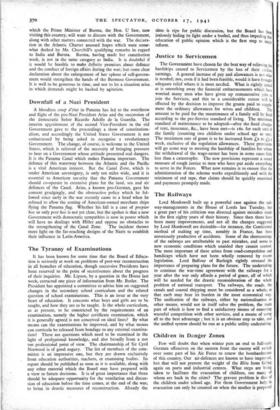The Tyranny of Examinations
It has been known for some time that the Board of Educa- tion is seriously at work on problems of post-war reconstruction in all branches of education, though successive Presidents have been reserved to the point of secretiveness about the progress of their inquiries. Mr. Lipson, by a question in the House last week, extracted one piece of information from Mr. Butler. The President has appointed a committee to advise him on suggested changes in the secondary school curriculum and the related question of school examinations. This is an issue at the very- heart of education. It concerns what boys and girls are to be taught, and how they are to be taught. Is the whole curriculum, as at present, to be constricted by the requirements of an examination, namely the higher certificate examination, which it is generally agreed is not conceived on ideal lines? By what means can the examinations be improved, and by what means can curricula be released from bondage to any external examina- tion? These are questions which need to be examined in the light of prof9sional knowledge, and also broadly from a not too professional point of view. The chairmanship of Sir Cyril Norwood is of good augury. The list of members of the com- mittee is an impressive one, but they are drawn exclusively from education authorities, teachers, or examining bodies. Its report should be published as soon as it is available, along with any other material which the Board may have prepared with a view to future decisions. It is of great importance that there should be adequate- opportunity for the ventilation and discus- sion of education before the time comes, at the end of the war, to bring in drastic measures of reconstruction. Already the time. is ripe for public discussion, but the Board has been jealously hiding its light under a bushel, and thus impeding that education of public opinion which is the first step to major reform.


























 Previous page
Previous page